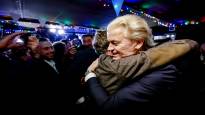The long-term populist politician Geert Wilders hit a gold mine that can give him significant influence in the Netherlands and Europe, writes EU correspondent Rikhard Husu.
Rikhard HusuEU correspondent
HAGUE The up-and-coming campaign of the far-right PVV party culminated in a landslide election victory achieved on Wednesday.
A quarter of the Dutch voted for a critic of Islam and a supporter of a strict immigration policy Geert Wilders for the Freedom Party.
The rise of the PVV could already be seen in opinion polls before the election day. However, the party’s superiority on election day also seemed to surprise the experts.
Wilders, who spoke to his party at the election supervisors, said that he would strive for power, boosted by the election victory. According to him, the Freedom Party cannot be ignored in future government negotiations.
Wilders also criticized Holland’s immigration policy by stating that the “tsunami” of immigrants and asylum seekers needs to be stopped.
There has been criticism of immigration policy one of the main topics of the far-right in the autumn elections.
Wilders’ message has resonated with Dutch people struggling with rising living costs and housing shortages.
But is there understanding for Wilders also in the Dutch party field? The question will be in the center when the examination of the new government foundation begins after the elections.
Despite its election victory, Wilders’ party needs the support of at least two or three other parties to form a majority government.
The most natural partners would be the outgoing prime minister Mark Rutten From the VVD party and the newcomer to the party field, the NSC party. Both have spoken in favor of a stricter immigration policy.
Cooperation between Wilders and the former EU commissioner Frans Timmermans with the red-green electoral alliance led by
According to Timmermans, he will not participate in a government that claims that asylum seekers are the beginning of all evil.
A government based on the Freedom Party would also take Wilders to the EU’s decision-making tables. Strongly critical of the EU, Wilders’ positions differ from the constructive EU policy represented by Prime Minister Rutte.
The Freedom Party has, among other things, hinted at Holland’s departure from the EU and criticized common symbols of the EU, such as the EU flag.
Wilders has also expressed his readiness to end arms aid to the Netherlands for Ukraine.
Of course, Wilders also has friends in Europe. Leader of the French National Alliance Marine Le Pen and the Prime Minister of Hungary Viktor Orbán were among the first congratulators after the election victory of the Freedom Party.
